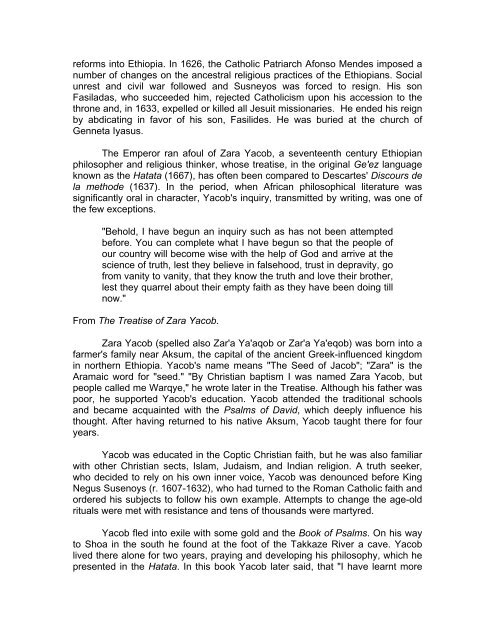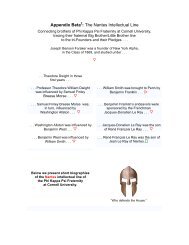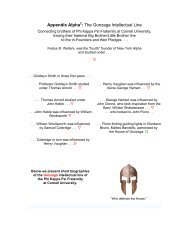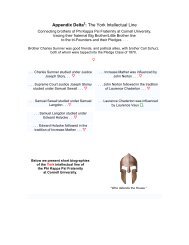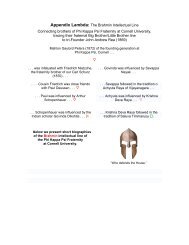Gondar - Phi Kappa Psi
Gondar - Phi Kappa Psi
Gondar - Phi Kappa Psi
You also want an ePaper? Increase the reach of your titles
YUMPU automatically turns print PDFs into web optimized ePapers that Google loves.
eforms into Ethiopia. In 1626, the Catholic Patriarch Afonso Mendes imposed a<br />
number of changes on the ancestral religious practices of the Ethiopians. Social<br />
unrest and civil war followed and Susneyos was forced to resign. His son<br />
Fasiladas, who succeeded him, rejected Catholicism upon his accession to the<br />
throne and, in 1633, expelled or killed all Jesuit missionaries. He ended his reign<br />
by abdicating in favor of his son, Fasilides. He was buried at the church of<br />
Genneta Iyasus.<br />
The Emperor ran afoul of Zara Yacob, a seventeenth century Ethiopian<br />
philosopher and religious thinker, whose treatise, in the original Ge'ez language<br />
known as the Hatata (1667), has often been compared to Descartes' Discours de<br />
la methode (1637). In the period, when African philosophical literature was<br />
significantly oral in character, Yacob's inquiry, transmitted by writing, was one of<br />
the few exceptions.<br />
"Behold, I have begun an inquiry such as has not been attempted<br />
before. You can complete what I have begun so that the people of<br />
our country will become wise with the help of God and arrive at the<br />
science of truth, lest they believe in falsehood, trust in depravity, go<br />
from vanity to vanity, that they know the truth and love their brother,<br />
lest they quarrel about their empty faith as they have been doing till<br />
now."<br />
From The Treatise of Zara Yacob.<br />
Zara Yacob (spelled also Zar'a Ya'aqob or Zar'a Ya'eqob) was born into a<br />
farmer's family near Aksum, the capital of the ancient Greek-influenced kingdom<br />
in northern Ethiopia. Yacob's name means "The Seed of Jacob"; "Zara" is the<br />
Aramaic word for "seed." "By Christian baptism I was named Zara Yacob, but<br />
people called me Warqye," he wrote later in the Treatise. Although his father was<br />
poor, he supported Yacob's education. Yacob attended the traditional schools<br />
and became acquainted with the Psalms of David, which deeply influence his<br />
thought. After having returned to his native Aksum, Yacob taught there for four<br />
years.<br />
Yacob was educated in the Coptic Christian faith, but he was also familiar<br />
with other Christian sects, Islam, Judaism, and Indian religion. A truth seeker,<br />
who decided to rely on his own inner voice, Yacob was denounced before King<br />
Negus Susenoys (r. 1607-1632), who had turned to the Roman Catholic faith and<br />
ordered his subjects to follow his own example. Attempts to change the age-old<br />
rituals were met with resistance and tens of thousands were martyred.<br />
Yacob fled into exile with some gold and the Book of Psalms. On his way<br />
to Shoa in the south he found at the foot of the Takkaze River a cave. Yacob<br />
lived there alone for two years, praying and developing his philosophy, which he<br />
presented in the Hatata. In this book Yacob later said, that "I have learnt more


